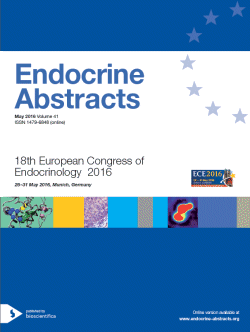Guided Posters
Endocrine Nursing
ea0041gp100 | Endocrine Nursing | ECE2016
The risk of obstructive sleep apnea and correlation with cardiovascular risk factors in patients with pituitary adenomas
ea0041gp101 | Endocrine Nursing | ECE2016
Waist to height ratio as a new marker of metabolic syndrome in type 2 diabetic patients
Horchani Imen , Oueslati Mehdi , Ouerfelli Meriem , Oueslati Ibtissem , Khiari Karima , Abdallah Nejib Ben
ea0041gp102 | Endocrine Nursing | ECE2016
Influence of educational training course in improving the knowledge of diabetes mellitus among nurses of Diabetes Education Units in Albania
Kermaj Marjeta , Ylli Dorina , Zeqja Anisa , Fureraj Thanas , Hoxha Violeta , Husi Gerond , Ylli Agron
ea0041gp103 | Endocrine Nursing | ECE2016
Type 1 diabetes and attention deficit hyperactivity disorder: development of new educational material
Sjoberg Sofia , Edgren Magnus , Gutefeldt Kerstin
ea0041gp104 | Endocrine Nursing | ECE2016
Diabetic foot workshop to apply interactive learning method for nurses: working with real patient as a teaching strategy
Amini Mohammad Reza , Mehrdad Neda , Sanjari Mahnaz , Aalaa Maryam , Shahbazi Samimeh , Shaygabmehr Zahra , Tehrani Mohammad Reza Mohajeri , Adibi Hossein
ea0041gp105 | Endocrine Nursing | ECE2016
Short synacthen test – ESN only?
Hawkins Anna , Solomou Solomis , Nikookam Yasmin , Casey Edel , Nikookam Khash
ea0041gp106 | Endocrine Nursing | ECE2016
Assessment of fall status and activity of daily living in older people with type 2 diabetes
Aalaa Maryam , Mehrdad Neda , Sanjari Mahnaz , Amini Mohammad Reza
ea0041gp107 | Endocrine Nursing | ECE2016
Managing children with diabetes within the family: living in the orbit of diabetes
Sanjari Mahnaz , Mehrdad Neda , Peyrovi Hamid
ea0041gp108 | Endocrine Nursing | ECE2016
Childhood leukemia survivors’ experiences of long-term follow-up in an endocrine clinic: a focus group study
Palsson Anna , Malmstrom Marlene , Follin Cecilia




